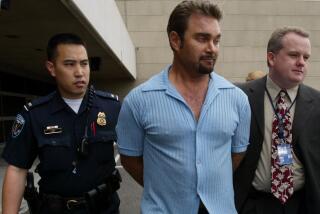Women Appear to Be on GHB, Expert Says at Date-Rape Trial
- Share via
Two young women whose sexual encounters with date-rape suspect Andrew Luster were captured on videotape appear to be in drug-induced comas during the alleged assaults, a toxicologist testified Tuesday.
UC San Francisco associate professor Jo Dyer told jurors that based on her review of the tapes, the snoring, groggy women appear to be under the influence of gamma hydroxybutyrate, or GHB.
Dyer described the substance as a potent, slightly salty-tasting, clear and odorless liquid that can easily be slipped into a woman’s drink to render her unconscious within minutes.
“It will knock you out reliably at a certain dose,” Dyer testified. “GHB is very dangerous.”
Ventura County prosecutors charge that Luster, 39, a surfer and the great-grandson of cosmetics mogul Max Factor, used GHB to incapacitate at least three women before raping them at his Mussel Shoals beach house. He is charged with multiple counts of rape of intoxicated and unconscious women, as well as sexual battery, poisoning, sodomy and drug possession.
Defense attorneys, who delayed giving an opening statement, have argued that Luster engaged in consensual sex with the women.
Luster’s lawyers have portrayed the women as embarrassed college coeds who lied about the sexual encounters. The defense has suggested that corrupt law enforcement officers manipulated the evidence against their client.
Prosecutors launched their case Tuesday in Ventura County Superior Court by calling Dyer, a drug and poison specialist, as their first witness. She said she began chronicling GHB abuse after first encountering the drug 12 years ago when called by doctors treating a severe coma patient at a Bay Area hospital. Since then, she has documented 88 cases involving GHB abuse and researched 20 deaths linked to the drug, which was developed in France as an anesthetic.
GHB, which in low doses produces a feeling of euphoria, has gained popularity among young adults in the dance club scene, in part because it is easy to manufacture, Dyer said. She told the jury it could easily be whipped up at home by combining glue remover and drain cleaner.
Prosecutors hired Dyer, at a cost of $300 an hour, to offer an opinion about whether the three women in Luster’s case were drugged and unconscious at the time of the alleged rapes.
Based on her review of two roughly 30-minute videotapes and statements by the alleged victims, Dyer concluded that the women were poisoned by GHB.
But defense attorney Roger Jon Diamond challenged Dyer and questioned whether prosecutors had provided her enough information.
He displayed a large photograph of one of the women, a 21-year-old UC Santa Barbara student, smiling as she sat between two men, one of whom was shirtless.
The photo was taken at Luster’s home after she and her friend David met Luster and his friend at a Santa Barbara bar.
Prosecutors concede that the evidence will show that she and David had sex in the back of Luster’s car on the way to the defendant’s house, but say the pair were under the influence of GHB after being drugged by Luster.
Defense attorneys question the rape allegations in light of the earlier sexual encounter in the car, and point to the photograph as strong evidence to back up their theory.
Under Diamond’s questioning, Dyer admitted that she was not shown the photo before reaching her conclusions. But she testified that it wouldn’t have made a difference in her overall opinion.
More to Read
Sign up for Essential California
The most important California stories and recommendations in your inbox every morning.
You may occasionally receive promotional content from the Los Angeles Times.










